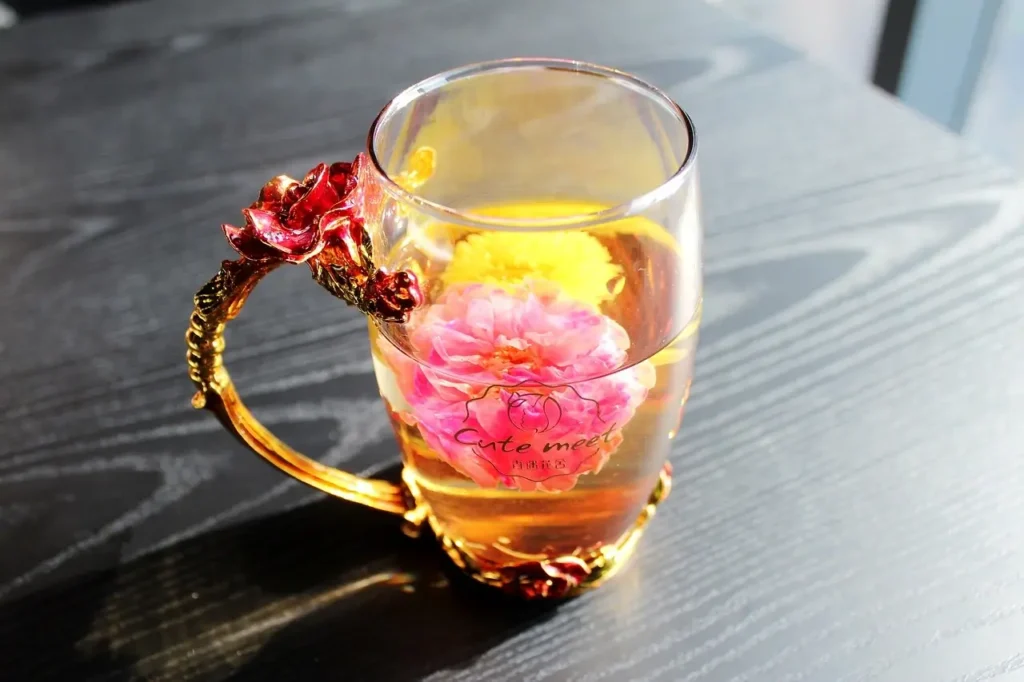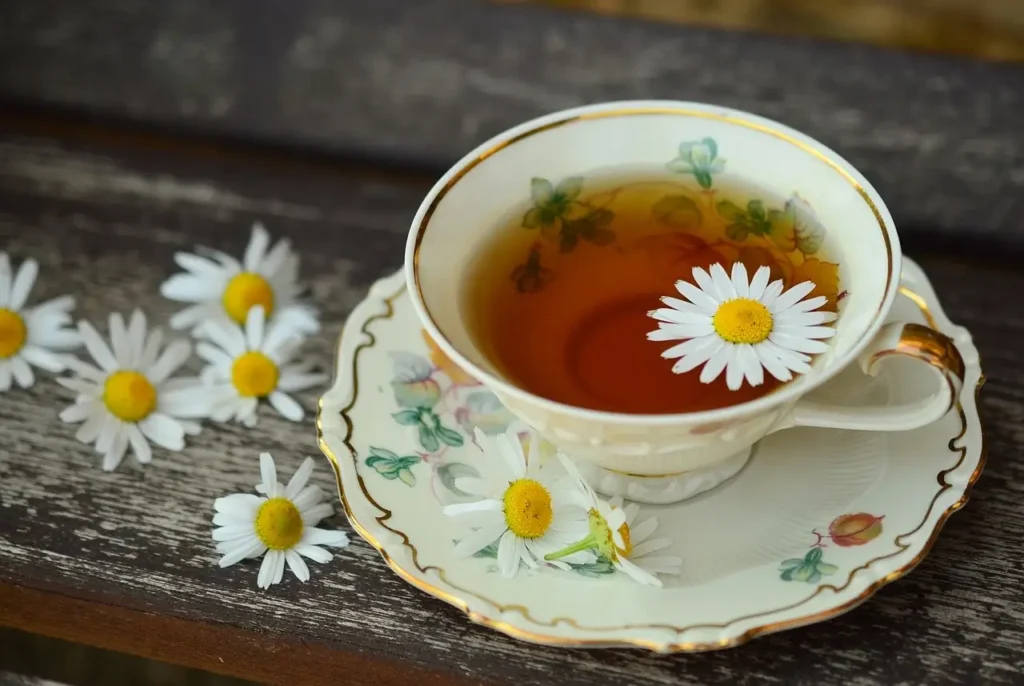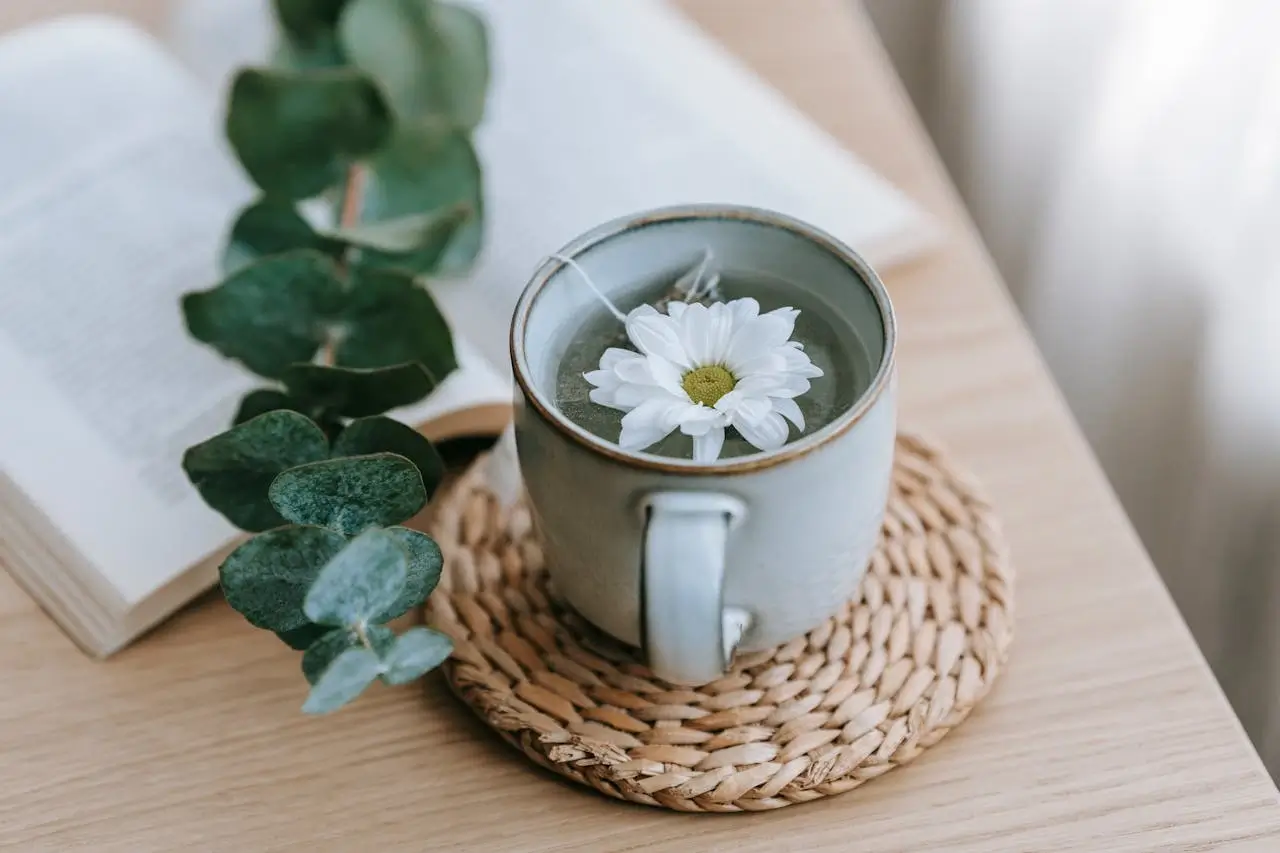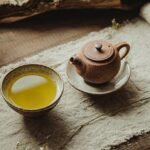Table of Contents
Chrysanthemum tea has long been a staple in traditional medicine, particularly in Chinese culture. This delicate tea, made from the dried flowers of the chrysanthemum plant, is known for its health benefits. But does chrysanthemum tea make you sleepy? In this article, we’ll explore whether sipping this floral beverage before bed can help you relax, or if it provides other benefits. Read on to learn more about this soothing tea and how it aids in sleep.
The Natural Properties of Chrysanthemum Tea
Chrysanthemum Tea Benefits
Chrysanthemum teas are more than just a delightful beverage; it is a powerhouse of natural benefits that make it a must-have in your herbal tea collection. It also aids in sleep, promoting relaxation while improving sleep quality.
Key Benefits:
- Promotes relaxation and reduces stress.
- Contains natural sedative effects for better sleep.
- Packed with antioxidants that support immune health.
- Chrysanthemum extract is rich in compounds that help calm nerves and promote tranquility.
“Chrysanthemum tea has been cherished for centuries for its calming and health-boosting properties, making it a perfect addition to your wellness routine.”
Natural Sedative Effects
The soothing properties of chrysanthemum tea stem from its unique blend of calming ingredients, which help to reduce stress and promote relaxation.
Why It’s a Natural Sedative:
- Contains active compounds that lower stress hormones.
- Promotes a peaceful state of mind, perfect for unwinding.
- Ideal as a bedtime drink to prepare your body for rest.
Herbal Tea Properties
| Property | Benefit |
|---|---|
| Antioxidants | Fights oxidative stress and supports immunity. |
| Natural Sedative Effects | Reduces stress and enhances relaxation. |
| Calming Ingredients | Promotes mental and physical tranquility. |
With such remarkable chrysanthemum tea benefits, it’s easy to see why this fragrant herbal tea is loved worldwide.
Guides: Brew 1-2 teaspoons of dried chrysanthemum flowers in hot water, add honey or lemon, and enjoy a soothing cup anytime you need to unwind.
Does Chrysanthemum Tea Make You Sleepy?
The question of whether chrysanthemum tea makes you sleepy is one that has garnered much attention, particularly among those looking for natural ways to relax or improve sleep quality. While chrysanthemum tea is not directly classified as a sedative, it has properties that can help the body relax.
1. Chrysanthemums Tea and Relaxation
One of the main reasons people might think chrysanthemums tea makes you sleepy is due to its calming effects. Drinking a warm cup of this herbal tea can induce a state of relaxation, which is why it’s often consumed in the evening. The gentle floral aroma and the act of sipping something warm can help reduce stress, which in turn can make you feel more at ease.
2. Does It Contain Sleep-Inducing Compounds?

Chrysanthemum tea does not contain melatonin or other sleep-inducing compounds. However, its natural anti-inflammatory and antioxidant properties can help reduce discomfort or stress that may interfere with falling asleep. For those who struggle with anxiety or tension at the end of the day, chrysanthemum tea can create a more serene environment, indirectly making it easier to sleep.
3. Non-Caffeinated Beverage
Does chrysanthemum tea contain caffeine? The answer is no—chrysanthemum tea is completely caffeine-free. Caffeine is a stimulant that can hinder sleep, so the absence of it makes chrysanthemum tea a much better choice for those who are sensitive to caffeine or who want to avoid it in the evenings. Many people switch to herbal teas like chrysanthemum to avoid the jittery effects that caffeinated beverages bring.
Caffeine-free teas like chrysanthemum are excellent alternatives to traditional black or green teas, especially for those looking to wind down before bed.
4. Traditional Chinese Medicine and Sleep
In traditional Chinese medicine (TCM), chrysanthemum tea is praised for its ability to cool the body and reduce heat, often associated with restlessness. According to TCM principles, imbalances in the body’s heat levels can lead to sleep disturbances. Drinking chrysanthemum tea can help restore balance and promote a sense of calm, potentially supporting better sleep patterns over time.
5. Personal Experience: Varying Effects on Sleep
It’s important to remember that the effects of chrysanthemum tea on sleep can vary from person to person. While some may find that it helps them relax and drift off to sleep, others may not experience any noticeable difference. If you’re considering using chrysanthemum tea as a sleep aid, it might be worth experimenting to see how your body responds.
Comparing Chrysanthemum Tea with Other Herbal Teas for Sleep: Which is More Effective?
Best Teas for Sleep Comparison: Choosing the Right Herbal Remedy for Your Needs
When it comes to choosing the best sleep teas, the options can be overwhelming. However, a closer look at chamomile, chrysanthemum, and lavender tea reveals distinct benefits that cater to different needs. Let’s dive into this comparison to help you make an informed choice.
Chamomile vs Chrysanthemum vs Lavender Tea: Which is More Effective for Sleep?
Chamomile tea is often celebrated as a go-to solution for insomnia due to its calming properties. It contains apigenin, an antioxidant that binds to certain receptors in your brain that may promote sleepiness and reduce insomnia. Chamomile’s gentle floral notes make it a soothing pre-bedtime ritual.
Herbal Tea Benefits for Insomnia: How Chrysanthemum Tea Helps You Sleep Better
On the other hand, chrysanthemum tea is gaining popularity as a powerful alternative for those seeking herbal remedies for better sleep. Known for its mild sedative effects, chrysanthemum tea helps relax the nerves and muscles while also reducing stress levels—a common culprit of sleepless nights. Its subtle sweetness and light flavor offer a refreshing change from more traditional options.
Lavender Tea for Relaxation and Sleep: A Complementary Herbal Solution
Lavender tea rounds out our comparison with its well-known relaxing properties. The aromatic compounds found in lavender are believed to enhance mood and promote restful sleep by reducing anxiety levels.
In conclusion, while all three teas—chamomile vs chrysanthemum vs lavender—offer unique herbal benefits for insomnia relief, chrysanthemum stands out with its dual ability to calm both body and mind effectively. For those who have tried chamomile or lavender without success or are simply looking for something new, chrysanthemum tea might just be the perfect addition to your nightly routine.
Does Chrysanthemum Tea Contain Caffeine?

As mentioned earlier, chrysanthemum tea is entirely caffeine-free. This makes it a perfect choice for those who are looking to reduce their caffeine intake. Many people are sensitive to caffeine, especially when consumed later in the day, as it can disrupt their sleep cycle.
Choosing a caffeine-free alternative like chrysanthemum tea not only helps with relaxation but also avoids the potential negative side effects of caffeine, such as jitteriness, anxiety, and sleep disturbances. If you’re looking for a beverage that can be consumed at any time of day, without worrying about its impact on your energy levels, chrysanthemum tea is an excellent option.
Benefits of Caffeine-Free Teas
- No disruption to sleep patterns: Herbal teas like chrysanthemum ensure that your sleep won’t be affected by caffeine.
- Suitable for all ages: Because it lacks caffeine, chrysanthemum tea is safe for children, adults, and even elderly individuals who may need to limit caffeine for health reasons.
- Soothing and hydrating: Like most herbal teas, chrysanthemum tea is hydrating and soothing, making it a great choice for relaxation without any stimulant effects.
Chrysanthemum Tea Side Effects
Chrysanthemum tea is generally considered safe for most people, but it may cause side effects in some individuals. One of the most common side effects is allergic reactions, especially for those sensitive to ragweed or other plants in the Asteraceae family. Symptoms may include skin rashes, itching, or even difficulty breathing.
Additionally, excessive consumption of chrysanthemum tea could potentially lead to digestive issues like nausea or stomach discomfort. If you are pregnant, breastfeeding, or taking medication, it’s always best to consult with a healthcare provider before incorporating chrysanthemum tea into your routine.
How to Brew the Perfect Cup of Chrysanthemum Tea for Optimal Relaxation and Sleep Benefits
Best Way to Prepare Chrysanthemum Tea for Maximum Tea Health Benefits
Brewing the perfect cup of chrysanthemum tea is an art that can unlock its full potential for relaxation and sleep benefits. The best way to prepare chrysanthemum tea starts with selecting high-quality dried flowers, known for their soothing properties. Begin by measuring about two teaspoons of these delicate blossoms and placing them in your favorite teapot or infuser.
Brewing Techniques for Relaxation Teas
For optimal results, use freshly boiled water that has slightly cooled to around 90°C (194°F). Pour the water over the flowers, allowing them to steep for 5 to 7 minutes. This brewing technique ensures that you extract all the calming compounds without compromising the gentle flavor of the tea.
Enhancing the Effects of Calming Teas with Proper Preparation
To enhance the effects of this calming brew, consider these simple yet powerful additions:
- Fresh Ginger: Add a slice of fresh ginger to boost its soothing properties and add a subtle, warming flavor.
- Natural Honey: Stir in a teaspoon of honey to complement the tea’s gentle aroma while amplifying its relaxation effects.
Proper preparation not only maximizes relaxation but also transforms your tea ritual into a moment of tranquility and peace. By embracing this method, you can experience chrysanthemum tea’s full spectrum of benefits, particularly in the evenings to promote better sleep and relaxation.
The Best Times to Drink Chrysanthemum Tea for Maximum Effectiveness in Promoting Sleepiness
When it comes to harnessing the soothing benefits of chrysanthemum tea for a restful night’s sleep, timing is everything. Understanding when to drink chrysanthemum tea for better sleep can significantly enhance its effectiveness in promoting sleepiness and easing insomnia.
Chrysanthemum tea is renowned for its calming properties, making it an ideal herbal remedy for those struggling with sleepless nights. To maximize its potential, consider timing your herbal remedies strategically. Ideally, you should consume chrysanthemum tea about 30 to 45 minutes before bedtime. This window allows the natural compounds in the tea to work harmoniously with your body’s relaxation processes, gently lulling you into a state of tranquility.
Incorporating this routine into your evening ritual not only signals your body that it’s time to wind down but also creates a consistent pattern that reinforces healthy sleep habits. By aligning your consumption of chrysanthemum tea with these optimal times, you can effectively leverage its benefits and enjoy more restful and rejuvenating sleep.
Final Thoughts: Should You Drink Chrysanthemum Tea Before Bed?
So, does chrysanthemum tea make you sleepy? While it doesn’t contain any sleep-inducing compounds, it’s caffeine-free and can promote relaxation, which might help you fall asleep more easily. For those looking to incorporate a natural and gentle tea into their nightly routine, chrysanthemum tea could be a great addition.
Whether you’re enjoying chrysanthemum tea for its calming properties or simply because you like its taste, it’s clear that this herbal infusion offers a variety of benefits without the drawbacks of caffeine.












